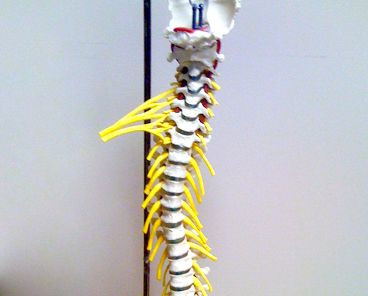Implant jab could solve the misery of back pain

Chronic lower back pain is a major problem for society – behind only headaches as the most common neurological ailment – and is frequently caused by degeneration of the intervertebral disc.
Researchers have worked for many years to find a way of repairing the wear and tear on the lower back.
Now, in results published in the journal Soft Matter, they have discovered how to permanently replace the workings of the invertebral disc.
It is estimated that back pain affects 80% of people at some point in their lives. In the United States it is the most common cause of job-related disability, a leading contributor to people missing work.
The University of Manchester cross-faculty team have been working with microgel particles, which are swellable nanoscopic polymer particles, for a number of years.
Previously, they have demonstrated that an injectable fluid of these particles could transform into a gel that restored the mechanical properties of damaged model intervertebral discs.
Lead researcher Dr Brian Saunders, of the School of Materials, and his team have now succeeded in linking the microgel particles together to form injectable durable, elastic gels capable of sustaining large permanent changes in shape without breaking.
These improved injectable gels have much better mechanical properties than the first generation and should now display the necessary long-term durability required for an implanted device.
In this study the researchers – who include PhD student Amir Milani and Dr Ruixue Liu – have achieved an important milestone for producing injectable gels for minimally-invasive repair of IVD degeneration.
Dr Saunders said: ““Our team has made a breakthrough through innovative materials design that brings the prospect of an injectable gel for treating degeneration of the intervertebral disc a step closer.
Professor Tony Freemont, Head of Research in the School of Biomedicine, and co-author on the paper, added:
“Degeneration of the intervertebral disc results in chronic back pain which costs the country billions of pounds per annum and causes untold misery for sufferers and their families.
“We have been working for 25 years to identify methods for treating degeneration of the intervertebral disc.”
This work has been funded by the EPSRC and was recently awarded Proof-of-Principle (PoP) funding by The University of Manchester Intellectual Property Limited (UMIP).



























